The 17th International Symposium on Persistent Toxic Substances & Health is being held at the University of Macau (UM) from today (18 September) to 22 September. The symposium focuses on hot issues and emerging trends in international environmental chemistry and ecotoxicology. It aims to provide a platform for in-depth exchanges between global experts and researchers in the field of persistent toxic substances, and to promote international academic exchanges and cooperation in related fields.
Organised by UM, Hong Kong Baptist University, Research Center for Eco-Environmental Sciences of the Chinese Academy of Sciences, and UMTec Limited, the symposium brings together about 150 delegates from different countries and regions, such as Australia, Canada, mainland China, Hong Kong, Macao, and Taiwan, who share their insights on the fields concerned.
UM Vice Rector Mok Kai Meng said in his opening remarks that persistent toxic pollutants, which have significant impacts on humans and ecosystems, have attracted the attention of governments and environmental scientists worldwide and have become a popular research field in international environmental science. As one of the organisers of the symposium, UM hopes to take the lead in strengthening cooperation, technical exchange, and talent development for scientists in the field, while improving the level of governance in environmental chemistry and ecotoxicology in China, in order to make scientific and technological contributions to the resolution of international environmental toxic pollution issues.
The symposium focuses on the environmental impacts of persistent toxic pollutants, monitoring and assessment methods, chemical analysis, sources and transport of pollutants, public communication, potential risks to ecosystems and human health, and pollutant control and remediation technologies. Experts and scholars from around the world share their latest findings and cutting-edge technologies in their respective fields of research. In addition to keynote speeches, discussions, and oral presentations, the symposium also includes the Young Scientist Award presentation and poster session to further inspire technological development and innovation in the field.
Guests attending the opening ceremony included Huang Shengbiao, deputy head of the Economic Affairs Department of the Liaison Office of the Central People’s Government in the Macao SAR; Jiang Guibin, academician of the Research Center for Eco-Environmental Sciences of the Chinese Academy of Sciences and the founding chair of the symposium; Xu Jian, vice rector of UM; Chan Hou Wo, head of the Planning and Development Division of the Water Resources Department, Marine and Water Bureau; Ng Si Io, head of the Environmental Planning Division of the Environmental Planning and Assessment Department, Environmental Protection Bureau; Lao Ieng Wai, head of the Meteorological Monitoring Centre of the Meteorological and Geophysics Bureau; Xu Cheng-Zhong, dean of the Faculty of Science and Technology of UM; and Xu Jie, head of the Department of Ocean Science and Technology of the Faculty of Science and Technology, UM.
The International Symposium on Persistent Toxic Substances, which was first held in 2004, is in its 17th edition this year. It has received significant attention and acclaim from the international industry and academia and has become a high-level conference with an international reputation. In the future, the symposium will continue to focus on the control and management of toxic pollutants and make greater contributions to protecting human health and the ecological environment.
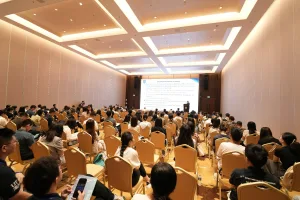
The 17th International Symposium on Persistent Toxic Substances and Health
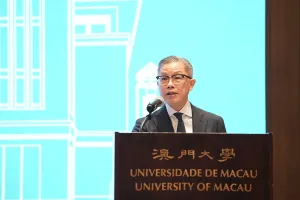
Mok Kai Meng delivered opening speech
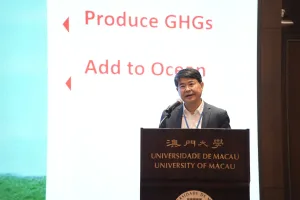
A presentation by an expert
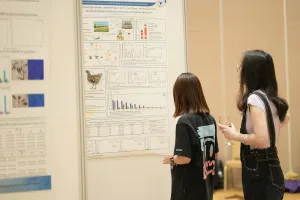
The poster session
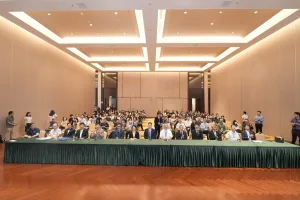
Group Photo
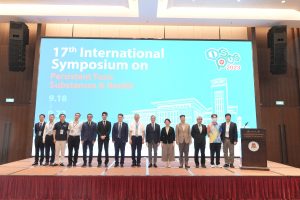
Group Photo
